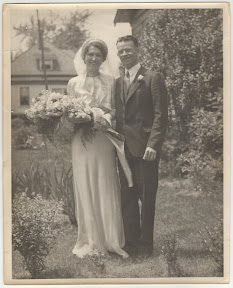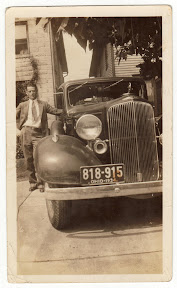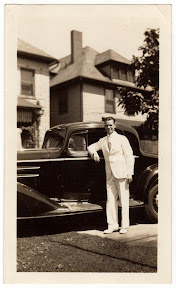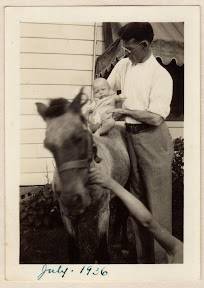
As a child, I knew two things about my Grandfather McEntee: he died very young, although I had no idea at what age, and he was the original Stephen Jerome McEntee; my dad and my brother were each given the same name. I knew that my father and my uncle were 5 years old and my aunts were 4 and 3 years old when he died. I have the sense that his presence loomed large over the family even into the years of my childhood, partly because my grandmother never removed her wedding rings, never remarried, never even dated as far as I knew. But there were never photos of him around her house. I saw my first pictures of him sometime in the 1990s.
When I began this journey into genealogy with the gift of my Great Grandpa Keener's materials, I knew nothing about the family history of any other parts of my family. Because of the absence of my Grandfather McEntee, the mystery of who he was and his origins, he was the one that next captured my attention.
I first tried asking my grandmother about my grandfather. This was 1996 or so though. Grandma had already been plagued with increasing dementia for a few years by then. Sometimes she could answer questions but other times the questions would lead to frustration on her part. There were a few times that she said in her frustration, "Why do you want to know these things? You might find something bad." First of all, imagine that spoken with what remained of her Jersey accent after six decades in Ohio. And find something bad? Isn't that just what you always hope for in genealogy research...a really cool scandal or something? I haven't found a scandal yet and suffice to say that Grandma was not able to offer much in the way of names or information in my McEntee search. I believe I did learn during one of those trips that my grandfather's parents' names were Patrick and Elizabeth. That, coupled with the information that Grandma had lived near my grandfather in NJ growing up (he was living with an aunt and cousins during that time) was the extent of what she could remember.
This was back in the pre-Ancestry.com days, so the best online resource for genealogy was the volume of surname and regional lists from Rootsweb which were at that time run off some university server in the Midwest. Through one of these lists, I found out that earlier death certificates were available at the Ohio Historical Society, located in Columbus where I lived at the time, and arranged my schedule to visit during their daytime hours. This process was so simple that I later ended up making regular trips there for pulling death certificate copies for people from all over the country that needed them from Ohio, but on that first visit, I was only after my grandfather's death certificate in search of information.
The actual process of securing my grandfather's death certificate took less than 30 minutes from pulling into the parking lot to walking out the door, but the information on that certificate gave me hours more of pondering the sketchy history.
The medical reasons for my grandfather's death caught my attention first. He had passed away within three days of seeking treatment with the doctor, Dr. Durling, a name still common in Wadsworth during my childhood, for an intestinal obstruction complicated with surgical shock. The surgery that had been performed was listed as "Intestinal resection and anastomosis," basically removal of a section of intestine, probably gangrenous from the obstruction, and joining of the ends after removal. The certificate also listed "Previous laparotomies with crippling intestinal adhesions." He may have been living with intestinal problems for some time.
Who knows what the root of these problems for my grandfather was. He could have had some intestinal problem that is quite treatable today, diverticulitis, or even recurrent, not too invasive intestinal cancer. Who knows? But the implications of having this in 1941 would have been grave. The process of producing Penicillin was just brought to the US from Oxford and presented to the pharmaceutical companies that summer of 1941 and the technology transfer really didn't happen until October of 1941, so infection for someone having surgery or even prior to surgery would have been uncontrollable. Pain would have been awful and controlled by morphine so he may have spent those last few days oblivious to his approaching death.
This must have been an incredibly traumatic experience for my grandmother, watching the man she loved and had married just six years before die that way. I don't know what amount of time she spent at the hospital with him or at home with my dad and his siblings, but either way, the trauma of the whole process most likely changed who she was at her very core. No wonder she didn't speak of my grandfather's illness or the events of his death much. No wonder sickness and health were not things I typically heard in discussions in Grandma's home during my childhood. I have a memory from when I was about 9 or 10; my brother and I both came down with the Mumps when we were spending the night at Grandma's house. I'm sure because of the impact the Mumps has on child immune systems that we were very quickly pretty darn sick little kids spiking pretty high fevers, but I very clearly remember my grandmother, not unkindly but very sternly telling us that we needed to just be strong and we would be just fine. It seems like an odd reaction to sick children, but in retrospect, I would guess that sudden onset illnesses really freaked her out for the rest of her life. Those memories of my grandfather's death may have overshadowed her life for a very long time.
My grandfather's death certificate also reflects some details of his life, one being a birth date of December 26th, 1900, making him at least 11 years older than Grandma. I now know this date is incorrect; In the 1900 US Census, he is listed as having been born in 1898, making him more than 13 years older than she was. And the date of December 26th is the Feast of St. Stephen in the Western Church. In Ireland, the Feast of St. Stephen is a national holiday, so Irish immigrants would have been much more aware of this holiday than we in the US today are. His father, having been born in Ireland, and his mother, the child of Irish immigrants, may have found this significant enough for his name.
My grandfather's parents are listed on his death certificate, Patrick McEntee and Elizabeth Garrity, both listed as born in Ireland, and then my grandfather's own birthplace of Philadelphia, Pennsylvania. The birthplace of his mother I now believe is incorrect as indications are that she was born in Philadelphia as well, but I had names with which to move forward and some evidence that the family was from post-Potato Famine immigration like so many other Irish immigrants in the second half of the 19th Century. And I had Philadelphia, which would be the next stop on my McEntee roots search, a whole separate story.
My grandparents on their wedding day, 1935:

I've heard that my grandfather was very fond of his cars:


My grandfather with (I think) Dad or maybe Uncle Dick...hard to tell (picture taken while visiting the Norris relatives?):

If you have something to add to the story from your own experience, don't hesitate to comment on the blog entry by clicking on the comments text below. If you are logged in, your comment will include your name. If you are not logged in and you leave a comment as anonymous, please let me know who you are.
